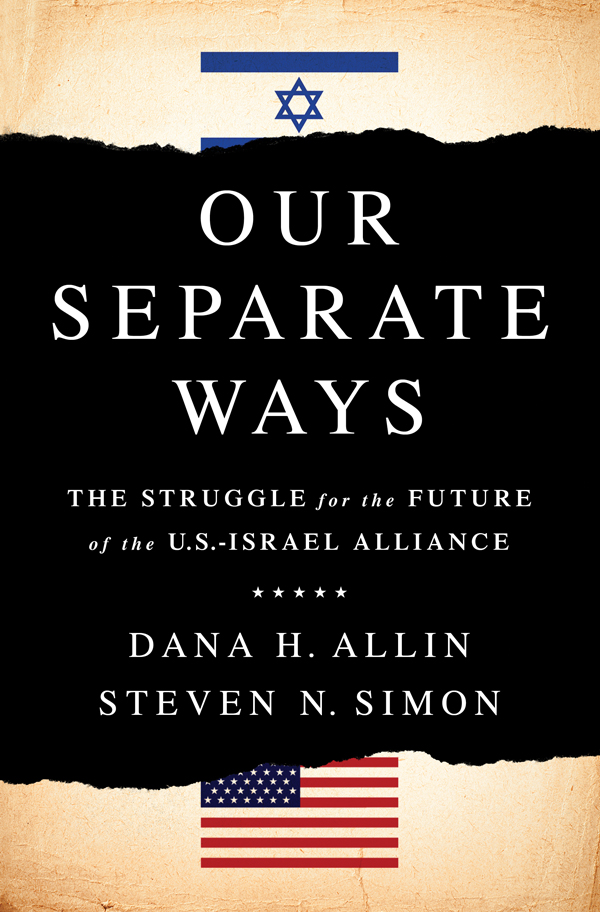Contents
Guide
Our Separate Ways
OUR SEPARATE WAYS
THE STRUGGLE for the FUTURE of the U.S.ISRAEL ALLIANCE

DANA H. ALLIN
STEVEN N. SIMON

PUBLIC AFFAIRS
NEW YORK

Copyright 2016 by Dana H. Allin and Steven N. Simon
Published in the United States by PublicAffairs, a Member of the Perseus Books Group
All rights reserved.
Printed in the United States of America.
No part of this book may be reproduced in any manner whatsoever without written permission except in the case of brief quotations embodied in critical articles and reviews. For information, address PublicAffairs, 250 West 57th Street, 15th Floor, New York, NY 10107.
PublicAffairs books are available at special discounts for bulk purchases in the U.S. by corporations, institutions, and other organizations. For more information, please contact the Special Markets Department at the Perseus Books Group, 2300 Chestnut Street, Suite 200, Philadelphia, PA 19103, call (800) 810-4145, ext. 5000, or e-mail special.markets@perseusbooks.com.
Book design by Milenda Nan Ok Lee
The Library of Congress has cataloged the printed edition as follows:
Names: Allin, Dana H., 1958 author. | Simon, Steven, author.
Title: Our separate ways : the struggle for the future of the U.S.-Israel alliance / Dana H. Allin and Steven N. Simon.
Description: First edition. | New York : PublicAffairs, [2016] | ?2016
Identifiers: LCCN 2016006444 (print) | LCCN 2016006749 (ebook) | ISBN 9781610396417 (hardback) | ISBN 9781610396424 (ebook)
Subjects: LCSH: IsraelForeign relationsUnited States. | United StatesForeign relationsIsrael. | BISAC: POLITICAL SCIENCE / International Relations / Diplomacy. | HISTORY / Middle East / Israel.
Classification: LCC E183.8.I7 A43 2016 (print) | LCC E183.8.I7 (ebook) | DDC 327.5694073dc23
LC record available at http://lccn.loc.gov/2016006444
First Edition
10 9 8 7 6 5 4 3 2 1
To David P. Calleo
D. H. A.
To Julius and Anna Simon: May their memories be for a blessing
S. N. S
Contents
IN MAY 2011sixteen months before President Obamas reelection, when his prospects were starting to look precariousthe prime minister of Israel arrived at the White House to lecture the president of the United States. As astonished journalists watched and recorded, Benjamin Netanyahu instructed a stone-faced Obama on the Jewish peoples many millennia of struggle, and on the impossibility of Israel ever returning to anything like the June 1967 borders that Obama himself had, just the day before, established as the basis for negotiating a just and lasting peace.
White House aides were furious, and they became angrier still as Netanyahu returned in the months and even weeks before the election and appeared to intervenebrazenly, as they saw iton the side of Republican nominee, Mitt Romney. Among the Republican charges that he seemed to be backing was that a feckless Obama preferred appeasement to confronting Irans growing nuclear capacity and its threat to Israels existence. Obama, Romney enjoyed repeating, was inclined to throw Israel under the bus. In political terms, this seemed a potent and worrying charge.
And yet a strange thing happened. Election night 2012 was over by 11:15 P.M . eastern time. Obama won every swing state but North Carolina with an ease that suggested an emerging Democratic lock on the Electoral College.
The entire episode was dismaying for leaders of the pro-Israel lobby in the United States, one of whom complained to us privately that by ineptly injecting Israel into U.S. partisan politics, the emperorthat is, the supposed power of the Israeli government and its U.S. supporters in Washingtonnow stood naked. That embarrassment was compounded over the next three years as Netanyahu led his mainly Republican allies in an effort in the U.S. Congress to kill the nuclear deal with Iranone of the central achievements of Obamas presidencyand failed again. These missteps were correspondingly satisfying to the Israel lobbys critics, who have long felt that American, and ultimately Israeli, interests require a more normal relationship between the two countries, and that this will only be possible once the lobby becomes less powerful.
The satisfaction and the dismay are both understandable. But both sides are missing something important. The U.S.Israeli alliance is not simply under strain; it is at risk of being fundamentally transformed by long-term trends in both countries that will be impossible to stop and difficult to manage. Powerful demographic and cultural currents in Israel and the United States are driving the two countries apart. On the American side, the commitment of a postwar generation to the ideals of Zionism is fading as that generation moves toward old age. The demographic basis of support for an intimate alliance is also eroding. Four generations of intermarriage have weakened both Jewish identity and the visceral attachment that many Jews have felt since the establishment of the State of Israel in 1948. American Jews are not destined to disappear in any genetic sense, but as a cohesive community dedicated to Israels security and deeply entangled in its fate, they are dwindling. This will leave behind a tougher core of Jews who are often orthodox in their religious practice and mainly conservative in their political preferences. As we shall see, this will place them outside the political mainstream, even as it concentrates them in fewer and less dispersed communities.
A more general decline in the religious commitment of younger Americans will also have consequences for their commitment to Israel. Conservative Christianity remains powerful and almost exclusively Republican; yet even organized Evangelicalism shows signs of change. The shifting preferences for religious organizations in an age of social media, splintered communities, and demographic change could eventually affect the priorities of younger Evangelicals. They are not the Jerry Falwelllet alone the Billy Grahamgeneration, packing stadium rallies staged by Christians United for Israel. Some have other worries and other projects closer to the social gospel than to more traditional conservative causes. These newer preoccupations no longer emphasize American support for a strong Israel so that the eschatological prophecies of the Book of Revelation come to pass. When they see news coverage of civilian deaths in Gaza and they ask themselveswhat would Jesus do?the answer is not self-evident. For now, this is only a nascent trend within a broader hardening of political and social attitudes. Time will tell whether it gets traction as the country as a whole shifts to the left.
The consolidation of a LikudRepublican alliance and the parallel emergence of a structural advantage for the Democratic Party in national elections will bring further trouble to the alliance. As the ardor of Democrats has cooled, their fortunes appear to be riding on the emergence of a bigger and more engaged Latino electorate. These voters are simply less concerned about the Middle East and, to the extent they harbor the religious convictions acquired in their countries of origin, they are less likely to share the concerns of Jewish Americans. The considerable American Jewish disappointment with Israel for its treatment of Palestinians, accurately identified by Peter Beinart, is therefore not even the most important of structural American changes.










